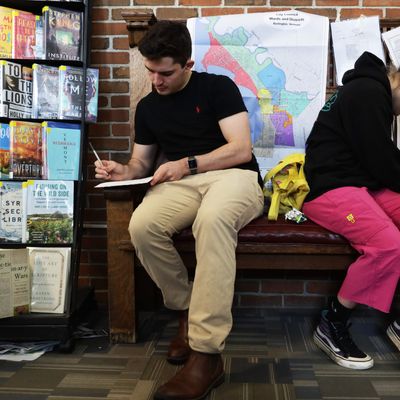
There’s been a lot of discussion about how to hold an election during or immediately after a pandemic that makes old-school, going-to-the-polls-on-Election-Day voting perilous. But before you can vote, you have to register to vote. With Democrats in particular counting on a good showing among young, first-time voters, obstacles to speedy registration are a separate problem for policymakers to ponder, as Sam Levine of the Guardian explains:
In a typical election year, canvassers across the country would be beginning to fan out on street corners, college campuses, concerts and rallies to pepper Americans with a simple question: “Are you registered to vote?”
This early work is critical to campaigns trying to build a support base for election day. But this year, the Covid-19 pandemic has made it nearly impossible to register new voters.
That’s true of time-tested ways of registering new voters face-to-face, which is a labor-intensive but not that complicated a process. Now online voter registration is a must, but it’s not available everywhere. Ten states, including actual or potential 2020 presidential battlegrounds Maine, New Hampshire, North Carolina, and Texas (plus Senate battleground Montana), don’t have full-on online voter registration. And potential new voters in states that do make online registration available have to know about it and how to access it. Given the added lead time voting by mail requires, getting new voters quickly signed up in states that do make remote voting generally available is particularly urgent.
As Levine notes, this is another voting-rights issue with decided partisan implications:
Limited voter registration is most likely to affect young people, minority groups, and naturalized immigrants, groups projected to contribute to record-high turnout in November. Freezing them out is likely to benefit Republicans, who tend to see a more diverse and younger electorate as a threat.
In Kentucky, where Mitch McConnell faces a closely-watched Senate re-election battle in November, just 504 people registered in March as Covid-19 restrictions went in to effect. By comparison, more than 7,200 voters registered the month before.
In some states, Democrats are taking the bull by the horns:
On Tuesday, Texas Democrats announced a new website where voters can input their voter registration and have filled-out documents sent to them with prepaid envelopes. The party is aiming to register more than 1 million new voters.
Such strategies could be essential to registering voters en masse since a many voters register at motor vehicle offices, or DMVs, which are now closed. Over 35 million people registered to vote at DMVs between 2016 and 2018 – 45% of the registrations submitted.
The closure of these offices has also made it more difficult to get the identification required in many states to vote.
The Trump administration’s actions against immigrants, which have all but stopped naturalizations, are a problem too:
Newly naturalized immigrants, another important voting bloc, may also be disenfranchised this year. US Citizen and Immigration Services cancelled citizenship oath ceremonies and in-person interviews, which could leave about 441,000 nearly naturalized citizens unable to vote in November, according to NBC News.
If the 2020 elections are as close as most of us expect, then you can figure Team Trump and Republican operatives to do everything within their power to make first-time voter registrations difficult, at least in the many places where such voters are likely to vote the “wrong” way. It’s just one of a wide array of small but crucial battles that will take place at the state and local levels as November approaches.






























